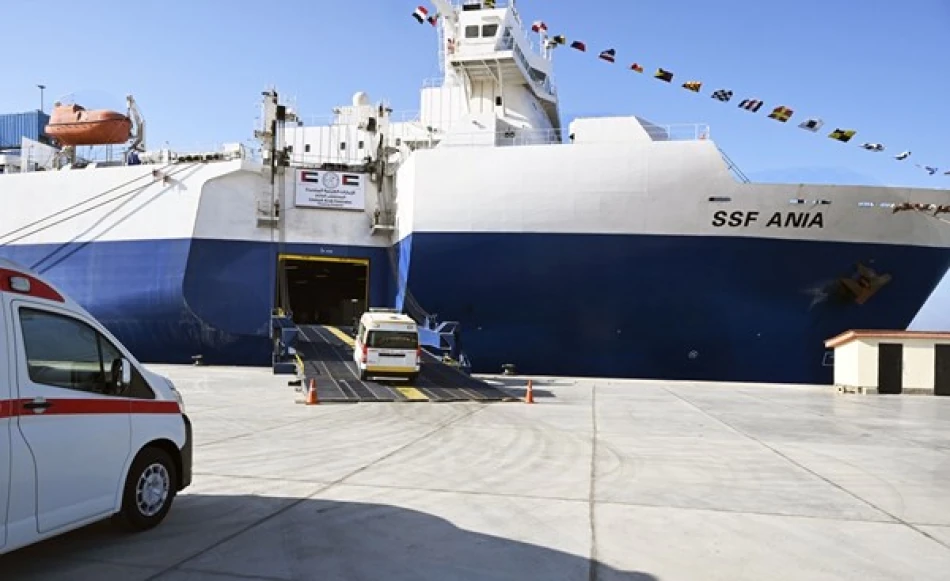
UAE Sustains Gaza's Healthcare Lifeline: A Vital Humanitarian Intervention
UAE's Medical Diplomacy in Gaza: A Strategic Humanitarian Investment That's Reshaping Regional Healthcare
The UAE has positioned itself as the Middle East's leading humanitarian power through its comprehensive medical intervention in Gaza, deploying over 1,200 tons of medical supplies and treating more than 61,000 patients since December 2023. This systematic approach to crisis healthcare delivery not only addresses immediate needs but establishes the Emirates as an indispensable regional stabilizer, potentially reshaping how Gulf states project soft power through medical diplomacy.
Field Operations: Building Healthcare Infrastructure from Scratch
The UAE's "Operation Gallant Knight 3" represents one of the most sophisticated humanitarian medical deployments in recent Middle Eastern history. The centerpiece—a 200-bed field hospital operating inside Gaza since December 2023—has handled over 51,000 cases, including complex surgical procedures that would challenge even well-equipped civilian hospitals.
The facility's capabilities extend beyond emergency care. UAE medical teams recently removed a 5-kilogram tumor from a patient who had suffered for years, demonstrating the hospital's capacity for advanced surgical interventions. More significantly, the UAE launched a specialized prosthetics program for amputees, addressing long-term rehabilitation needs that typically fall outside emergency humanitarian responses.
Floating Hospital: Maritime Medical Innovation
The deployment of a 100-bed floating hospital off Egypt's Al-Arish coast in February 2024 showcases the UAE's logistical sophistication. This vessel, equipped with operating theaters, intensive care units, and full diagnostic capabilities, has treated over 10,370 cases through April, effectively creating a offshore medical hub that bypasses traditional border restrictions.
This maritime approach mirrors strategies used by the U.S. Navy's hospital ships, but represents the first time a Gulf state has deployed such capabilities for civilian humanitarian purposes, signaling the UAE's evolution into a regional healthcare superpower.
Patient Evacuation: High-Stakes Medical Diplomacy
Perhaps the most politically sensitive aspect of the UAE's intervention involves evacuating 2,634 Palestinian patients and their families to Emirati hospitals as of May 14, 2024. President Sheikh Mohamed bin Zayed's directive to treat 1,000 cancer patients and 1,000 children represents a $100+ million commitment when factoring in complex medical care, accommodation, and logistics.
This patient transfer program accomplishes multiple objectives: it provides life-saving care unavailable locally, demonstrates the UAE's advanced healthcare capabilities, and creates lasting relationships with Palestinian families who will return home as living testimonials to Emirati generosity.
Strategic Implications: Soft Power Through Healthcare
The UAE's medical intervention strategy differs markedly from traditional humanitarian aid. Rather than simply sending supplies, the Emirates has created a comprehensive healthcare ecosystem that includes prevention (vaccinating 640,000 children against polio), treatment (field and floating hospitals), rehabilitation (prosthetics programs), and infrastructure development (17 ambulances, water systems, sewage repairs).
This approach parallels China's Belt and Road Initiative or Qatar's World Cup investments—using immediate humanitarian needs to build long-term strategic relationships and regional influence. The UAE's healthcare diplomacy creates dependencies and gratitude that purely financial aid cannot achieve.
Regional Competition and Positioning
The scale and sophistication of the UAE's Gaza intervention sends clear messages to regional competitors. While Saudi Arabia focuses on megaprojects and Qatar emphasizes diplomatic mediation, the UAE has claimed the humanitarian healthcare space, positioning itself as the region's crisis responder of choice.
This strategy proves particularly valuable given ongoing regional tensions. The UAE's medical diplomacy allows it to maintain relationships across political divides—treating Palestinian patients while maintaining ties with Israel, working through Egyptian logistics while building independent capabilities.
Economic and Investment Perspective
From an economic standpoint, the UAE's Gaza medical operations represent a calculated investment in regional stability and international reputation. The immediate costs—likely exceeding $200 million when including hospital operations, patient care, and logistics—pale compared to potential returns in enhanced regional influence and international standing.
For international investors and multinational corporations, the UAE's demonstrated crisis management capabilities and humanitarian leadership enhance its attractiveness as a regional hub. Companies increasingly factor ESG considerations and political stability into location decisions, and the UAE's proactive humanitarian stance strengthens both metrics.
Long-term Strategic Outcomes
The UAE's comprehensive medical intervention in Gaza establishes several important precedents. It demonstrates Gulf states' capacity for independent humanitarian action, showcases advanced logistics and medical capabilities, and creates a replicable model for future crisis responses.
More importantly, it positions the UAE as an indispensable regional actor whose humanitarian capabilities make it valuable to all parties regardless of political alignments. This medical diplomacy strategy could prove more durable and influential than traditional diplomatic or economic approaches, creating lasting relationships built on life-saving care rather than transactional agreements.
As regional conflicts continue and climate change increases humanitarian crises, the UAE's investment in rapid-deployment medical capabilities and systematic humanitarian response may prove to be one of the most strategically valuable soft power tools in the modern Middle East.
Most Viewed News

 Layla Al Mansoori
Layla Al Mansoori






